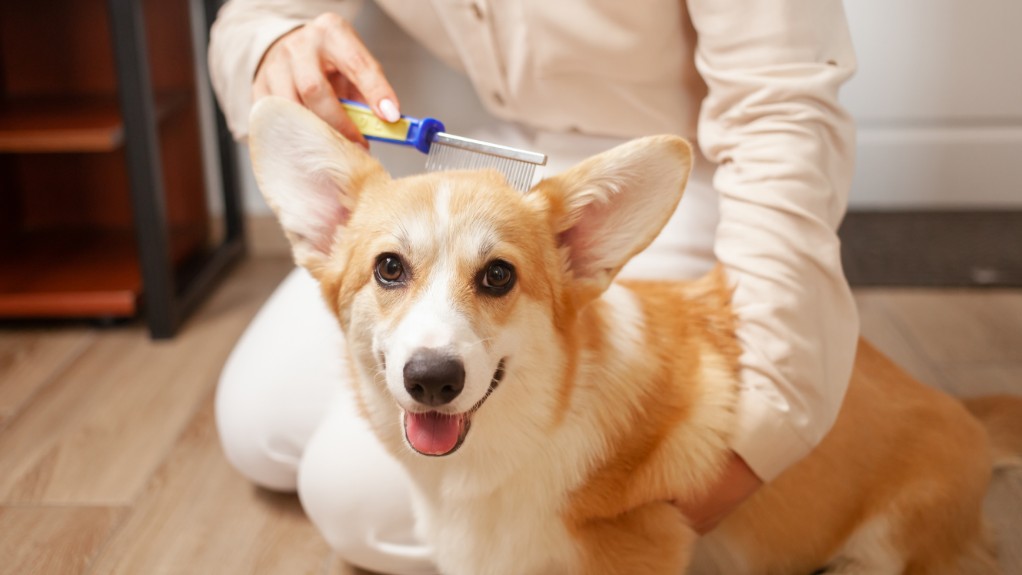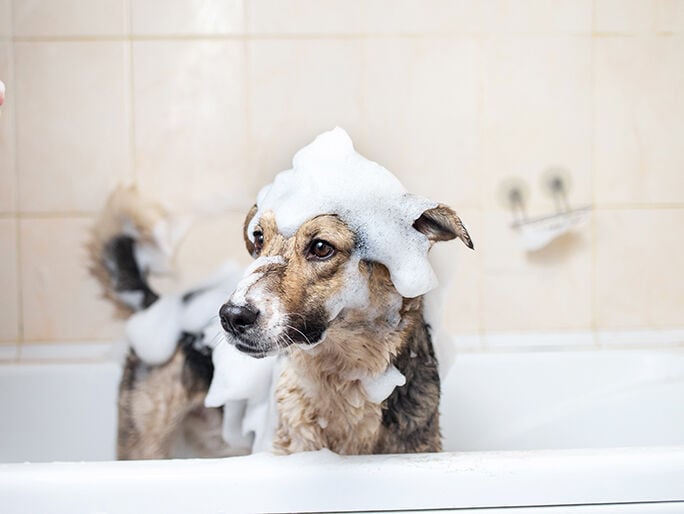why is my pet so itchy?
A cat or dog that can’t stop scratching could have fleas, allergies, or infections.
If your pet is constantly scratching, biting, clawing, or pawing at themselves, ask your veterinary team what we recommend to help them scratch that itch.

Common causes of itching in pets
- Fleas or flea allergy
- Dermatitis
- Seasonal allergies
- Topical allergies
- Food allergies
- Yeast infections

How to help itchy cats and dogs
- See your veterinary team ASAP
- Use regular parasite control
- Identify and work to treat allergies
- Treat skin infections
- Feed pets a high-quality diet
- Groom pets regularly
Remedies for itchy skin depend on the cause behind the itchiness
Extreme skin itchiness is often caused by inflammation, a sign that your pet’s immune system is responding to injury or infection. If your pet is itchy with raised hives, please seek veterinary care ASAP.

Look for flea dirt — a sign that your pet has fleas
If your pet is scratching, your first step should be to rule out fleas. Flea bites are notoriously itchy. Some pets even develop a flea allergy, which makes the itchiness from even a single bite almost unbearable.
Living fleas can be difficult to spot on your pet, so use a flea comb. Brush your pet’s hair against the direction where it usually grows, then wipe the comb on a paper towel.
Even if you don’t see a flea, you may find flea dirt — black specks of digested blood — in your pet’s fur or on your comb. This is a sure sign that your pet is dealing with an infestation that can benefit from veterinary treatment and parasite control.
Dermatitis can lead to itchy skin and hot spots
Pet itchiness can be a sign of dermatitis, or skin inflammation. The itchiness from dermatitis can make your pet scratch until they create bald patches and open sores.
Dermatitis is typically a sign of an underlying health issue. Inflammation can result from flea allergies, irritants, poor nutrition, seasonal allergies, skin infections, and many other concerns, each of which needs a different veterinary approach to help your uncomfortable pet.
The many underlying causes for dermatitis are why most home remedies for inflamed, itchy skin often just don’t work. In fact, many internet “cures” can even make matters worse.
Seasonal, environmental, and food allergies can make pets scratch
While people with allergies may sniffle or sneeze, pets typically develop an uncomfortable skin reaction. These skin allergies, called atopy, can be unrelentingly itchy and easily lead to secondary bacterial or fungal infections from scratching.
Allergies in pets often need lifelong support. Bring your pet in to see your veterinary team: Special prescription diets, medications, shampoos, and other solutions can help calm your pet’s inflammatory responses and make them more comfortable.
Yeast infections on dog skin can be extremely itchy
It’s not uncommon for dogs to get yeast infections in their ears or on their skin. This yeast is a kind of fungus that naturally exists in balance on your pet’s skin. But if something happens and the balance tips — for example, if your dog develops food or environmental allergies — the yeast can bloom out of control and cause a number of health problems.
Common areas for skin yeast infections are around dog mouths, between their toes, and tucked into skin creases that may trap yeast-friendly moisture. Look for skin that’s red, scaly, dry, or greasy, or patches of missing hair. (Dogs can also suffer yeast overgrowths inside their ears, causing ear infections.)
As with dermatitis, home remedies for yeast often miss the mark. Feeding your pet yogurt or slathering on coconut oil won’t cure skin yeast, and essential oils can be actively toxic. Your veterinary team can help with effective treatment for your pet.
Quality nutrition and regular grooming are key
Nutritionally balanced meals can help your pet’s body function from inside out. If your pet is itchy, it may help to think beyond the surface and explore your pet’s diet. Consult with your veterinary team if you think your pet may have a food allergy or other issue that may be causing them to shed or itch.
In addition to diet, it’s a great (and fun) idea to spend a little time on the outside of your pet too. Regular grooming can be a bonding experience that helps you check out your furball’s skin and coat. Brushing stimulates the skin, distributes natural oils, and can remove extra fluff, while washing can help loosen fur and skin flakes — just make sure to avoid over-washing and people shampoos that can dry out pet skin.

Mentioned in this article




Need advice on flea control? Ping Pet Chat™!
Whether it's 3 a.m. or 3 p.m., connect with a real veterinary professional for immediate petcare advice. It's included in all Optimum Wellness Plans®!
Log in to start chatting
Save at the Banfield Shop
Our mission is to provide high-quality prescription meds for the pet you love. We believe in safe, effective petcare, so we thoroughly assess every item we carry. We offer discounts on eligible products with your pet’s Optimum Wellness Plan. And you can easily schedule deliveries with our super convenient AutoShip program.
How Banfield can help with pet skin and coat care
We’re here to help your pet’s skin and coat be happy and healthy. From external parasites to skin problems to skin allergies and bumps or wounds, our vets can help with informed diagnoses and action plans to help your pet.

Get veterinary care for external parasites like fleas, ticks, and mites. From flea infestations to tick bites to ear mites and more, our vets can check out skin and coat cooties and recommend appropriate treatment. We’re happy to walk you through your options for year-round parasite control to help your pet!
Is your pet always itchy? Do you think your pet has a skin allergy? Causes for cat or dog itching and scratching can go more than skin deep. We can help figure out what’s causing your pet’s discomfort and suggest medications and treatments that can help your pet be more comfortable in their own skin.
See us for help with bald spots, shedding, greasy skin, and dandruff. Many pet health issues can affect your pet’s beautiful skin and coat. Whether it’s a flea allergy, dermatitis, seborrhea, allergies, anxiety-based issues, or other health concerns, our vets here to help with diagnosis and treatment.
Does your best furry friend have a cut or wound? Do you think they may have a tumor? Give us a call! Our vets can evaluate strange lumps and bumps and let you know if you can stop worrying. We can also help with wounds or direct you to the best resource to immediately help your pet.
 Mites and mange
Mites and mange Podcast - Not Just Fluff
Podcast - Not Just Fluff




